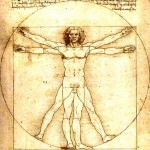Practical man & poetical man
 Rosh HaShanah is the anniversary of the world’s creation, with man as its pinnacle.
Rosh HaShanah is the anniversary of the world’s creation, with man as its pinnacle.
Man’s creation is described twice in the Torah, in chapters 1 and 2 of B’reshit. The accounts differ in mood, style, and language, so much so that Rav Soloveitchik suggested that it is as if two different Adams were created. He called them Adam One and Adam Two.
Adam One is Technological Man; Adam Two is the Lonely Man of Faith. We might paraphrase Rav Soloveitchik and call them Practical Man and Poetical Man.
Practical Man is a craftsman with a task to perform; his concern is not with the philosophy of his actions, but the details of the task itself, how he will carry it out, who will help him.
Adam Two is more of a thinker. He wants to know who he is and where he is going. His mind is turned to the ultimate questions. There is an existential loneliness about him.
The question is which Adam I am, or you are. Soloveitchik’s answer is that I am both. I oscillate between the practical and poetical sides of my being.
It is not that I am Dr Jekyll and Mr Hyde, for neither Adam is an evil being: both are good. Yet when we reflect on the Adam One-Adam Two dichotomy we see that one gets in the way of the other.
Poetical Adam is not much use when there is a practical task to be done; Practical Adam is out of his depth when there are deeper ultimate questions to be asked.
How then are we meant to handle the varying challenges of life with the appropriate persona?
The Chassidim have an idea that each person should have two pockets. In one should be a piece of paper that reads, “For my sake was the world created”: in the other, a piece of paper with the words, “I am earth and ashes”.
When my littleness overwhelms me, I need the first pocket; when I tend towards puffed-up conceit, the second pocket is there to remind me that cosmically I am quite insignificant.
In similar fashion I sometimes need to shake off the Adam One within me and become Adam Two, and at times I need to move back from Adam Two and become Adam One once more.
The High Holydays confront us with this choice. How many so-called worshippers emerge from the service and shake their heads and say, “Shule didn’t do anything for me!” But it is possibly because we are obsessed with being Adam One (“What’s happening in the office? Who won the game? The dinner is probably ruined in the oven!”).
We need to put Adam One and his concerns aside and let Adam Two take over. Only then, when in loneliness we face ourselves and our purpose, and reach out to God in faith, does holyday worship achieve anything for us.



